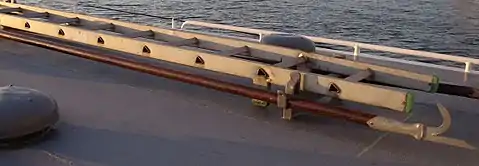ķeksis
Latvian

Laivas ķeksis

Ķeksis
Etymology
Cognates include Lithuanian kẽkšis, kẽkšė (“hook; stilt; pole”). There are similar words in neighboring non-Baltic languages: Livonian boathook, Estonian dialectal keks, käks, köks (“hook; harpoon”), Finnish keksi (“hook”), Norwegian kjeks, Swedish käx (“small boathook”), which led many researchers to conclude that the Latvian term was borrowed. But it is also possible that the other languages borrowed from Baltic; in which case ķeksis might continue Proto-Indo-European *kek- (“to curve, bend”) with an additional -s (compare Sanskrit कक्षा (kákṣā, “armpit, nook, corner”)); compare Latvian dialectal terms ḳekains (“hooked”), ḳeks, ḳeḳa (“crutches”), ḳeḳis (“person with crooked teeth”).[1]
Declension
Declension of ķeksis (2nd declension)
References
- Karulis, Konstantīns (1992), “ķeksis”, in Latviešu Etimoloģijas Vārdnīca (in Latvian), Rīga: AVOTS, →ISBN
This article is issued from Wiktionary. The text is licensed under Creative Commons - Attribution - Sharealike. Additional terms may apply for the media files.